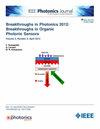用于单像素成像的变量多尺度误差补偿网络
IF 2.1
4区 工程技术
Q3 ENGINEERING, ELECTRICAL & ELECTRONIC
引用次数: 0
摘要
单像素成像是一种基于压缩传感的先进计算成像技术,与传统成像技术相比,它具有更高的信噪比和更广的应用范围。然而,传统的重建算法在采样和重建过程中存在处理时间长、重建精度低等问题。基于深度学习的压缩重建网络可以规避传统算法复杂的迭代计算,实现快速、高质量的重建。本文提出了基于变异自动编码器的变异多尺度误差补偿网络(VMSE)。VMSE 设计了一个误差补偿网络,以增强采样重建网络的特征表示能力。我们采用多个潜变量,在误差补偿网络的中间层生成不同尺度的误差特征,对重建图像进行补偿。此外,我们还设计了一个同时在空间域和频率域学习的模块,用于上采样和补充频率域缺失的高频信息。在 MNIST 数据集上,当采样率为 0.025 时,VMSE 获得了更高的峰值信噪比(PSNR)和结构相似性指数(SSIM)得分,尤其是 SSIM 得分为 0.963,大大超过了 Reconnet 和 DR2Net 分别为 0.930 和 0.920 的得分。实际实验进一步证实了这一点,在低采样率下,VMSE 比 TVAL3 能更清晰地重建轮廓。本文章由计算机程序翻译,如有差异,请以英文原文为准。
A Variational Multi-Scale Error Compensation Network for Single-Pixel Imaging
Single-pixel imaging is an advanced computational imaging technique based on compressive sensing that offers higher signal-to-noise ratio and broader application scope compared to traditional imaging techniques. However, conventional reconstruction algorithms suffer from issues such as long processing time and low reconstruction accuracy during the sampling and reconstruction processes. Deep learning-based compressed reconstruction networks can circumvent the complex iterative computations of traditional algorithms and achieve fast, high-quality reconstruction. In this paper, we propose a Variational Multi-Scale Error Compensation Network (VMSE) based on variational autoencoders. VMSE designs an error compensation network to enhance the feature representation capability of the sampling reconstruction network. We employ multiple latent variables to generate error features at different scales in the intermediate layers of the error compensation network, compensating the reconstructed image. Additionally, we design a module that simultaneously learns in the spatial and frequency domains, which is used for upsampling and complementing the missing high-frequency information in the frequency domain. On the MNIST dataset, when the sampling rate is 0.025, VMSE achieved higher Peak Signal-to-Noise Ratio(PSNR) and Structural Similarity Index(SSIM) scores, especially with an SSIM score of 0.963, significantly surpassing Reconnet and DR2Net's scores of 0.930 and 0.920, respectively. This was further corroborated by practical experiments, where at low sampling rates, VMSE could reconstruct outlines more clearly compared to TVAL3.
求助全文
通过发布文献求助,成功后即可免费获取论文全文。
去求助
来源期刊

IEEE Photonics Journal
ENGINEERING, ELECTRICAL & ELECTRONIC-OPTICS
CiteScore
4.50
自引率
8.30%
发文量
489
审稿时长
1.4 months
期刊介绍:
Breakthroughs in the generation of light and in its control and utilization have given rise to the field of Photonics, a rapidly expanding area of science and technology with major technological and economic impact. Photonics integrates quantum electronics and optics to accelerate progress in the generation of novel photon sources and in their utilization in emerging applications at the micro and nano scales spanning from the far-infrared/THz to the x-ray region of the electromagnetic spectrum. IEEE Photonics Journal is an online-only journal dedicated to the rapid disclosure of top-quality peer-reviewed research at the forefront of all areas of photonics. Contributions addressing issues ranging from fundamental understanding to emerging technologies and applications are within the scope of the Journal. The Journal includes topics in: Photon sources from far infrared to X-rays, Photonics materials and engineered photonic structures, Integrated optics and optoelectronic, Ultrafast, attosecond, high field and short wavelength photonics, Biophotonics, including DNA photonics, Nanophotonics, Magnetophotonics, Fundamentals of light propagation and interaction; nonlinear effects, Optical data storage, Fiber optics and optical communications devices, systems, and technologies, Micro Opto Electro Mechanical Systems (MOEMS), Microwave photonics, Optical Sensors.
 求助内容:
求助内容: 应助结果提醒方式:
应助结果提醒方式:


